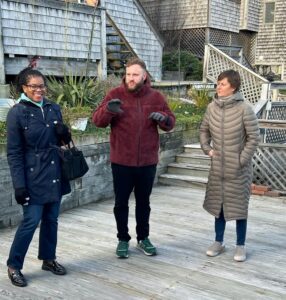PROVINCETOWN — Sen. Lydia Edwards of Boston, who represents the third Suffolk district and cochairs the state legislature’s joint committee on housing, visited Provincetown on Dec. 22 to talk with local leaders about the policies they think should be added to the upcoming housing bond bill.

What she heard were calls for solutions for middle-income people, ways to shorten long timelines caused by court battles, and steps to mitigate rising construction costs.
For her part, Edwards proposed better use of the federal Fair Housing Act, a law to promote desegregation that she said applies to cities and towns. She also advocated for one of the most high-profile features of the governor’s housing proposal, the local-option real estate transfer fee.
Edwards was with state Sen. Julian Cyr of Truro, who had accompanied her on stops in Hyannis and Nantucket. They started their day in Provincetown with an early-morning trip to the town-owned market-rate apartments at Harbor Hill, where they toured the apartment of select board member Erik Borg.
A gathering at town hall afterward included leaders from Provincetown, Truro, and Wellfleet. The senators provided the Independent with a recording of that meeting.
Beyond Boston
The $4.1-billion bill proposed by Gov. Maura Healey already has 25 policy proposals, Edwards said. “The bond bill is now in my committee, and our job is to shape it, get a decent draft, and get it moving,” she said. “I want to make sure the conversation is bigger than Boston, so we’re here to talk about your top issues and concerns.”
Assistant Town Manager Dan Riviello and Housing Specialist Michelle Jarusiewicz, both of Provincetown, said that middle-income housing projects such as Harbor Hill are essential for seasonal communities because of the roaring real estate market for vacation homes but are exceptionally hard to pay for without state money.
Limited funds and byzantine rules for middle-income housing made it necessary to reclassify 16 middle-income apartments at the 65-unit project at 3 Jerome Smith Road into lower-income units, Riviello said.
The developers of a 40-unit middle-income project at the site of the old police station on Shank Painter Road are currently asking the town for a $4-million subsidy, and with “the direction that costs are going, I expect that number to go up,” said select board member Austin Miller.
Cyr asked if anyone knew of specific changes to the funding rules that would help.
“I don’t know the answer to that question, but I know it’s an issue across the Outer Cape,” said Jarusiewicz.
Truro Assistant Town Manager Kelly Clark said that the developer’s costs have risen repeatedly as the timeline for building at the Cloverleaf project stretched out, in part due to a lawsuit. The Cloverleaf is a 3.9-acre parcel that was transferred to Truro from the state Dept. of Transportation in 2017.
One year ago, the Independent reported that the developer’s hard construction cost estimate for the project had risen 35 percent since 2020.
Wellfleet Select Board member Ryan Curley said that a project to build eight affordable units on five acres has been delayed by a total of 18 years, largely due to lawsuits brought by abutters.
“There needs to be a process that accelerates these legal proceedings,” said Curley.
He said that judges have been reticent to impose bonds on plaintiffs who sue to block housing, and that the bonds have not proved to be much of a deterrent. In his view, developers ought to be able to sue for damages when delays increase costs.
Time is on the side of abutters, Edwards said, adding, “I would absolutely love to figure out a way to have damages.”
Curley also asked that the state find a way to shield developers from rising interest rates and offer a sales tax exemption on construction materials.
“Right now, it’s around $600,000 for anybody to build a house,” said Curley. “It’s extremely unaffordable.”
Edwards also floated the idea of “zoning receivership.” Restrictive zoning violates civil rights, she said, and “that’s an argument we’re not using at all.” Towns that egregiously fail to permit fair housing should have their zoning bylaws rewritten by the state, she said.
Options for Transfer Fee
“We are so grateful that the governor proposed a transfer fee,” Cyr said, “but we do need to hear about the thresholds.” He argued that the governor’s proposal to impose the fee on anything above the median home price or anything above a million, whichever is higher, “leaves a lot of resources on the table.”
Cyr said he wanted to lower the thresholds while adding more exemptions for sales that would not pay the fee at all. Family transfers are already exempt in the governor’s proposal.
Edwards said that local options are important because the median house price varies a lot from town to town.
“There are towns that are too poor to have a million-dollar home, and then in Boston an average triple-decker is going for $3 million,” Edwards said. “We’re trying to find that perfect middle, but you have to listen to all these cities and towns.”
Edwards’s committee will take up the transfer fee at a public hearing on Jan. 18. Voters can submit written testimony or sign up for a three-minute speaking slot until Jan. 15.
“We have colleagues who are absolutely skeptical and do not want it,” Edwards said.
Cyr said that state Rep. Sarah Peake is working to get the transfer fee through the House.
“Your senator has done more than anyone on this topic, and now that the governor put it in there, this is our shot,” Edwards said.
“This is existential for us,” said Cyr. “The greatest risk facing the future of this state is something we’ve created. We have a red-hot economy. We are a welcoming, fabulous place, but people can’t live here, and people are losing hope. This is our moment.”



